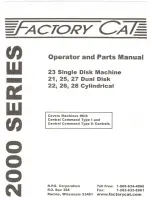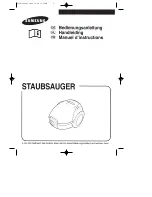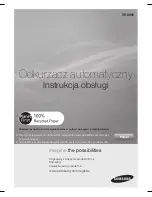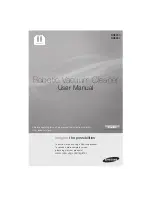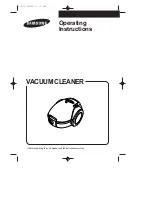
3
•
Do not use an extension cord unless it is absolutely
necessary – Using the wrong, damaged or improperly
wired extension cord poses a risk of fire and electric shock.
If an extension cord must be used, plug the charger into a
properly wired 18 AWG or larger extension cord with the
female plug matching the male plug on the charger. Make
sure that the extension cord is in good electrical condition.
•
Charger 24VCHRG-DPC is rated for 120 volt AC
only – The charger must be plugged into an appropriate
receptacle.
•
Use only recommended attachments – Use of an
attachment not recommended or sold by the battery
charger or battery pack manufacturer may result in risk of
fire, electric shock or personal injury.
•
Unplug charger when not in use – Make sure to remove
battery packs from unplugged chargers.
m
WARNING!
To reduce the risk of electric shock,
always unplug the charger before performing any cleaning or
maintenance. Do not allow water to flow into the charger.
Use a Ground Fault Circuit Interrupter (GFCI) to reduce
shock hazards.
•
Do not burn or incinerate battery packs – Battery packs
may explode, causing personal injury or damage. Toxic fumes
and materials are created when battery packs are burned.
•
Do not crush, drop or damage battery packs – Do not
use the battery packs or charger if they have sustained a
sharp blow, been dropped, run over or have been damaged
in any way (i.e. pierced with a nail, hit with a hammer,
stepped on, etc.).
•
Do not disassemble – Incorrect reassembly may pose
a serious risk of electric shock, fire or exposure to toxic
battery chemicals. If the batteries or charger are damaged,
please contact an authorized Snow Joe
®
+ Sun Joe
®
dealer
or call the Snow Joe
®
+ Sun Joe
®
customer service center
at 1-866-SNOWJOE (1-866-766-9563).
•
Battery chemicals cause serious burns – Never let a
damaged battery pack contact the skin, eyes or mouth.
If a damaged battery pack leaks battery chemicals,
use rubber or neoprene gloves to safely dispose of it. If skin
is exposed to battery fluids, wash the affected area with
soap and water and rinse with vinegar. If eyes are exposed
to battery chemicals, immediately flush with water for
20 minutes and seek medical attention. Remove and
dispose of contaminated clothing.
•
Do not short circuit – A battery pack will short circuit if
a metal object makes a connection between the positive
and negative contacts on the battery pack. Do not place a
battery pack near anything that may cause a short circuit,
such as paper clips, coins, keys, screws, nails and other
metallic objects. A short-circuited battery pack poses a risk
of fire and severe personal injury.
•
Store your battery packs and charger in a cool,
dry place – Do not store the battery packs or charger
where temperatures may exceed 105ºF (40.5ºC), such as in
direct sunlight or inside a vehicle or metal building during
the summer.
Protection from environmental influences
1. Wear suitable work clothes. Wear safety goggles.
2. Protect your cordless tool and the battery charger from
moisture and rain. Moisture and rain can cause dangerous
cell damage.
3. Do not use the cordless tool or the battery charger near
vapors and flammable liquids.
4. Use the battery charger and cordless tools only in dry
conditions and at an ambient temperature of 41°F – 105ºF
(5°C – 40.5°C).
5. Do not keep the battery charger in places where the
temperature is liable to reach over 105°F (40.5°C). In
particular, do not leave the battery charger in a car that is
parked in the sunshine.
6. Protect batteries from overheating. Overloads,
overcharging and exposure to direct sunlight will result
in overheating and cell damage. Never charge or work
with batteries that have been overheated – replace them
immediately, if possible.
7. Store the charger and your cordless tool only in dry
locations with an ambient temperature of 41ºF – 105°F
(5°C – 40.5°C). Store your lithium-ion battery packs in a
cool, dry place at a temperature of 77°F (25°C).
Protect the battery packs, charger and cordless tool from
humidity and direct sunlight. Only place fully charged
batteries in storage (charged to at least 40%).
8. Prevent the lithium-ion battery packs from freezing.
Battery packs that were stored below 32°F (0°C) for more
than 60 minutes must be discarded.
9. When handling batteries, be wary of electrostatic charge.
Electrostatic discharges can damage the electronic
protection system and the battery cells. Avoid electrostatic
charging and never touch the battery poles.
Information about the batteries
1. The battery packs supplied with your cordless
mulcher are only partially charged. The battery packs have
to be charged completely before you use the tool for the
first time.
2. For optimum battery performance, avoid low discharge
cycles by charging the battery packs frequently.
3. Store the battery packs in a cool place, ideally at
77°F (25°C) and charged to at least 40%.
4. Lithium-ion batteries are subject to a natural aging
process. The battery packs must be replaced at the latest
when its capacity falls to just 80% of its capacity when
new. Weakened cells in aged battery packs are no longer
capable of meeting the high power requirements needed
for the proper operation of your cordless
mulcher, and therefore pose a safety risk.
5.
Do not throw battery packs into an open fire as this poses
a risk of explosion.
6.
Do not ignite the battery packs or expose them to fire.



















